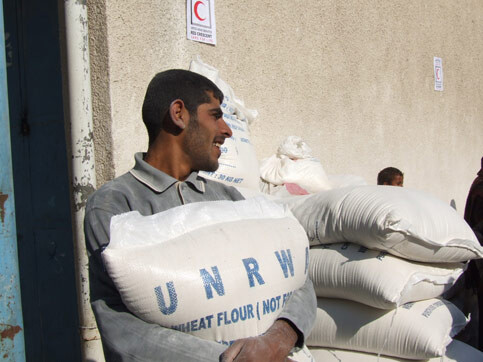The Electronic Intifada 1 December 2008

Food aid accounts for over two thirds of the US$462 million requested for the OPT in 2009. (UNRWA)
JERUSALEM (IRIN) - Food aid accounts for over two thirds of the 2009 $462 million requested by United Nations agencies and non-governmental organizations (NGOs) to fund humanitarian aid programs in the Occupied Palestinian Territories (OPT).
Food accounts for $209.4 million; next comes cash assistance ($133.3 million), followed by protection, emergency jobs, water and sanitation.
The consolidated appeal, launched on 26 November in Jerusalem to fund 96 projects from the NGO community and 63 from UN agencies, is a response to the deteriorating humanitarian situation in the OPT.
“This is getting pretty close to handouts, and we are quite sure that Palestinians would prefer to be in another situation,” said UN Humanitarian Coordinator in the Palestinian territories Maxwell Gaylard.
Palestinians are becoming increasingly dependent on humanitarian aid — with the global rise in food prices, the deepening rift between Palestinian factions; and the “de-development” process in the Gaza Strip is aggravating the situation.
Poverty, unemployment
A stringent Israeli blockade on Gaza has significantly increased poverty and unemployment in Gaza in the last year, according to UN officials. Israeli officials have repeatedly said the sanctions are in response to Palestinian militant groups’ rocket fire into Israel.
“More than 50 percent of Gaza families are living below the poverty line and unemployment in Gaza has reached 42 percent, one of the highest rates in the world,” said Deputy Commissioner-General for the UN agency for Palestine refugees, UNRWA, Filippo Grandi.
The aid will also help Palestinians in the West Bank where Israel’s wall and settlements and movement and access restrictions affect the lives and livelihoods of hundreds of thousands.
“This is an assault on human dignity with severe humanitarian implications,” said Gaylard. “Many people, especially in the Gaza Strip, are paying a heavy price, struggling daily to have enough food and water to feed and wash their children.”
The appeal and Palestinians’ increased dependency on humanitarian aid suggests that the Annapolis talks process, initiated in November 2007, has not improved the situation on the ground.
“Yes, there is a humanitarian crisis in Gaza,” said head of the UN Office for the Coordination of Humanitarian Affairs (OCHA) in the OPT, Phillippe Lazzarini, adding, “security and military reasons cannot prohibit an entire population’s access to aid.”
UNRWA relies on the Israeli authorities for access to Gaza to assist more than one million refugees living there, and the unpredictable closures prohibit planning, said UN Humanitarian Coordinator Gaylard.
UNRWA requested the largest share of the appeal, $275 million, the UN World Food Program second ($95 million) and then the UN Children’s Fund ($19 million).
“Since 4 November, under the tightened restrictions, UNRWA has only brought in 16 trucks of goods to Gaza. For the bare minimum we need 15 trucks to enter Gaza per day,” said UNRWA’s Grandi.
Globally, there are 12 humanitarian appeals for 2009 requesting $7 billion to assist 30 million people in 31 countries. The largest appeal was for Sudan, $2,189 million, while the Palestinian appeal was the sixth largest.
Protection
The significant appeal for the protection sector ($33 million) in the OPT is driven by the continuing Israeli military occupation. Many of the agencies submitting projects — like the Association for Civil Rights in Israel (ACRI), B’Tselem, and the Israeli Committee against Home Demolitions (ICAHD) — focus on human rights issues related to the occupation, resulting from Israeli military operations, air strikes, and incursions into the OPT.
There was a marked increase in the number of Palestinians killed and injured in conflict-related violence in 2008, while high rates of imprisonment of Palestinians inside Israel continue, according to the appeal.
This is the sixth consolidated appeal launched in the OPT, but despite the generosity of donors, the process of “de-development” continues.
“Things have not really changed, the blockade of Gaza was there last year and increasing West Bank closures were there last year,” said Grandi. “The situation will be the same next year, if the fundamentals in the political domain are not addressed,” he warned.
This item comes to you via IRIN, a UN humanitarian news and information service, but may not necessarily reflect the views of the United Nations or its agencies. All IRIN material may be reposted or reprinted free-of-charge; refer to the copyright page for conditions of use. IRIN is a project of the UN Office for the Coordination of Humanitarian Affairs.

